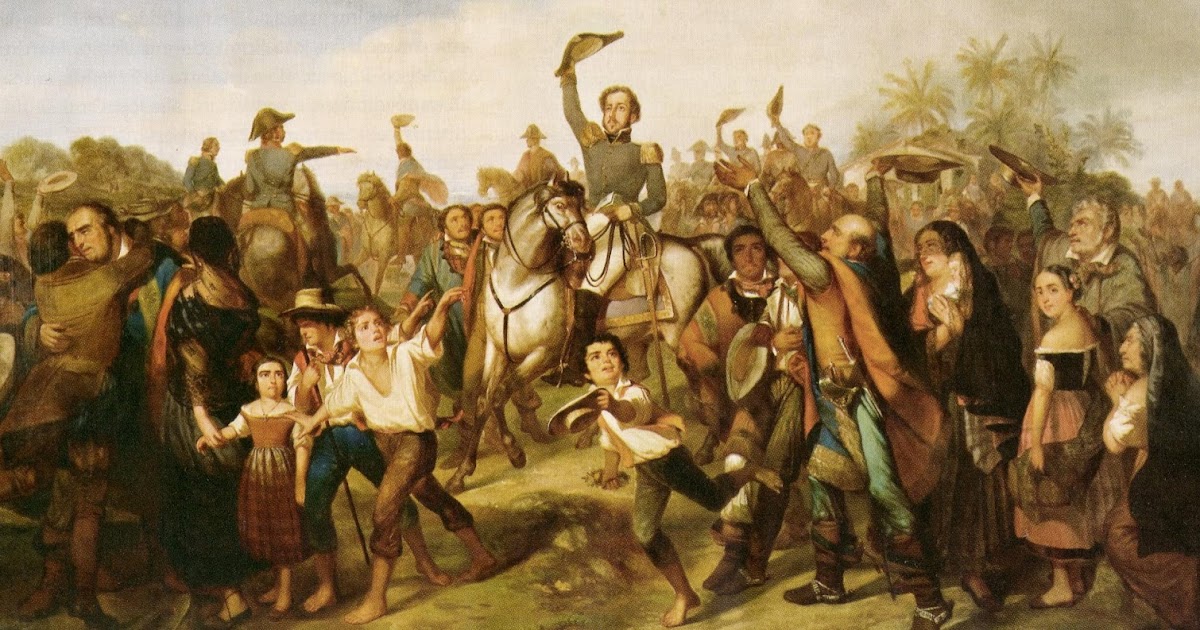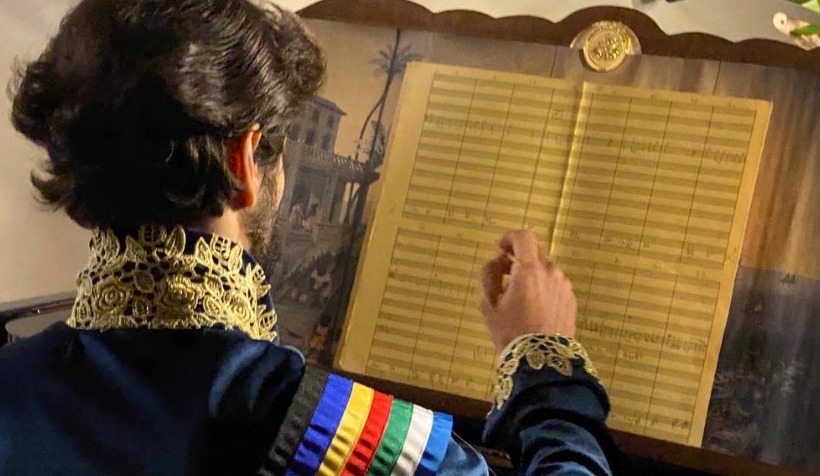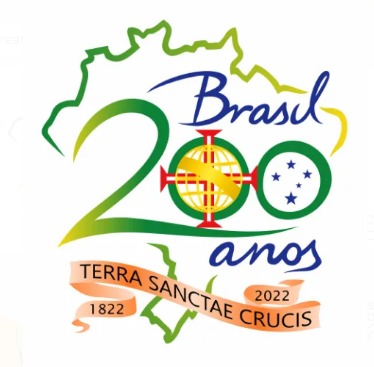RIO DE JANEIRO, BRAZIL – The ancient sounds of a bagpipe will pierce the air at Auditório Eber Vasconcelos in Brasilia this June 7, evoking the first musical instrument played in Brazil at the instant of discovery. It is a time-stopping moment in “Terra de Santa Cruz,” an original creation by historian and composer Malcolm Forrest celebrating the bicentennial of Brazil.
It is part of a carefully prepared, thoughtfully shaped, and history-laden Concerto do Bicentenario organized by Forest, representing the important multi-dimensional story of Brazil in a unifying and uncommon collection of the wonders through time and our relationship to self that classical music has to offer.
Terra de Santa Cruz refers to the original name given to Brazil by its discoverer, the adventurer, and nobleman Pedro Álvares Cabral. The bagpipes, an instrument that made its way to Portugal through the Romans, will blend into the full orchestra, the piano, and a mixed choir singing in different keys modulated through the hymn.
It is a musical journey in time, from the moment of the processional parade with the natives to the first mass celebrating the Portuguese ritual of taking possession of the land in the name of the king of Portugal and the Order of Christ.
The piece, drawing from the Chant of the Templars- Da Pacem Domine, will put the audience right in the essential time when, through the profound effect of the bagpipe swirls and drums, “the Indians seemed to understand that something divine, related to God, the skies, and to heaven was happening,” explains Forest.
The performance of the concert will be conducted by Maestro Cláudio Cohen and will also feature four original orchestral works composed by Dom Pedro himself as well as works by contemporary composers of Dom Pedro and his master, Marcos Portugal.
Cohen is the former Conductor and Musical Director of the Brasília Philharmonic Orchestra and one of the most renowned conductors of Brazil, often participating in the main Music Festivals of Brazil and abroad; he is also a tireless advocate for the National Theater.
Widely recognized for this talent and stature. Cohen was born in the city of Belém in the state of Pará and is an honorary citizen of Brasilia. He has been recognized as one of the most prominent personalities in the capital.
The maestro has conducted orchestras around the world, including the Österreichische Symphoniker Linz and the Euro Symphony SFK in Austria, the global epicenter of classical music, at the Orquestra Metropolitana de Lisboa in Portugal, the Vogtland Philarmonie Orchestra in Germany, and the Sinfônica de Roma in Italy along with orchestras in the US, Mexico, Ecuador, Argentina, Chile, Qatar, the Czech Republic, Spain, Israel, Romania, and throughout Brazil.
Austrian Ambassador Stefan Scholtz recently recognized Cohen with the Golden Cross Commendation of Science and Art of the Republic of Austria.
Compositions by Dom Pedro I are essential pieces in defining Brazil and its own experience. The Emperor Composer was the heir to centuries of the remarkable musical talent of the House of Bragança, a lineage of Portuguese kings, emperors, dukes, and princes who reigned in Europe and Brazil.
The emperor, a gifted singer and instrumentalist, had a solid musical formation and played at least seven orchestral instruments, including the piano, flute, clarinet, violin, contrabass, trombone, and harp; he organized numerous concerts in which he himself played in the orchestra.
Skilled and artful as a composer, Dom Pedro garnered recognition and praise in Europe. He wrote numerous pieces for orchestra and theatrical music, yet his most inspiring success was in producing patriotic music; his most important compositions are the “Hymn of Independence of Brazil,” which was quick to gain popularity, and the “Constitutional Anthem,” which would become the Portuguese national anthem.
The program for the Bicentennial Concert in Brasilia features “Abertura Independência,” an orchestra piece composed by Dom Pedro in 1819.
Work praised and conducted by Gioachino Rossini in Paris, October 30, 1831, followed by the beguiling effects of Ludwig van Beethoven’s Concerto for Piano and Orchestra No. 5. in E flat by soloist Alvaro Siviero, composed in Vienna around 1805 and dedicated to the Archbishop and Archduke Rudolf Habsburg, uncle of Dona Leopoldina.
Orchestra and continuous pieces “Mater et Magistra” and “Praeambulum et Canzona” by Malcolm Forest 2022 will follow from “A Jornada dos Príncipes,” a film commemorating the Bicentennial of the Independence of Brazil.
The orchestra will continue the operatic opening with “Overture in D” by João de Deus Castro Lobo, one of the biggest names in religious music from Minas Gerais in the early 19th century, along with pieces by Dom Pedro’s music teacher Marcos Portugal, the overture “Il Duca di Foix” and “Dramma per Música”, based on a libretto by Giuseppe Caravita, 1805, Lisbon.
The choir and orchestra will follow with the joyous hymn “Te Deum Laudamus” by Dom Pedro, offered to King Dom João VI by his son, the Royal Prince Dom Pedro de Alcantara, Duke of Bragança. October 21, 1820.
Conducted by Luíz Karam and compositor Malcolm Forest, “Terra de Santa Cruz” brings together the idea of the discovery with the sounds of the bagpipes and the traditions of Templars and the Order of Christ.
At the end of the quarter, a tribute to Dona Leopoldina is an instrumental part of the Austro-Hungarian Hymn with the choir singing of liberty, in homage to Dona Leopoldina’s role as the architect of the Independence of Brazil.
The fourth original piece on the piano, orchestra, and choir is “Libertas, Brazil” by Dom Pedro, a fantasy about the “Anthem of Independence,” an arrangement by Conductor Joaquim França Ramos. Inspired by the “Grande Fantasia Triunfal sobre o Hino Nacional Brasileiro.”
The piece paints the scenario of Dom Pedro leaving Santos on September 7 in the challenging environment of two centuries ago. In the beginning, there are sounds of nature, explains Forest.
The piano entrance introduces a cadenza in bravura, where the piano builds to a brilliant climax by executing different figures and fireworks and builds up with the choir then begins to sing the Brazilian Hino da Independência, a rousing patriotic celebration of the declaration of Independence.
Bringing the evening to a grand closing is” Glória in Excelsis Deo,” the fourth movement of the “Missa de Nossa Senhora do Carmo” composed by Dom Pedro, presented as dedicated and offered to Pope Leo XII for having accepted his request to declare São Pedro de Alcântara “Patron of Brazil.” It was first executed on December 5, 1829, and it is considered Dom Pedro’s best composition, explains Forest.
Malcolm Forest, the filmmaker, producer, and director and the force behind the organization of the concert, is also a historian and Vice-President of the Historical and Geographical Institute of São Paulo; he is the coordinator of the film production “Jornada dos Príncipes: Rumo ao Bicentenário da Independência do Brasil,” a historical documentary bringing to life the reasons and events of Brazil’s proclamation of Independence by retracing the “heroic journey of the princes.”
Specialized in composition and orchestration, Forest is knowledgeable and scholarly trained in guitar, theory, harmony, counterpoint, and musical phraseology. He is the composer of Hollywood’s “Walk of Fame Anthem” and scores of records as a songwriter and singer. Besides his original compositions in the Bicentennial Concert, he has also composed and produced the soundtrack for the film “Frei Galvão, o Arquiteto da Luz”.
Forest has narrated various documentaries of the Rio Turismo series for TV Corcovado and the series Beautiful Brazil for the International Channel of Los Angeles; a visionary environmentalist, Forest is also the founder of AMAR, an archeological and historical research NGO associated with UNESCO’s Planet Society that has been working to cover evidence of indigenous occupation and archaeological finds. Forest is the developer of the Brazilian project Forests and is currently directing “The Journey of the Princes.”
The Bicentennial Concert will get underway at 8 pm, Tickets are free, but it is necessary for people interested in attending to RSVP at: [email protected]. For more information, please call (11) 98205-0942.
Also commemorating Brazil’s bicentennial year this week, the Austrian Embassy is hosting the Austria-Brazil Commemorative Symposium at Rio de Janeiro’s Itamaraty Palace on June 7, exploring positive state-building and social development, political concepts and ideas for the post-colonial state, and Brazil’s influence in Europe.





